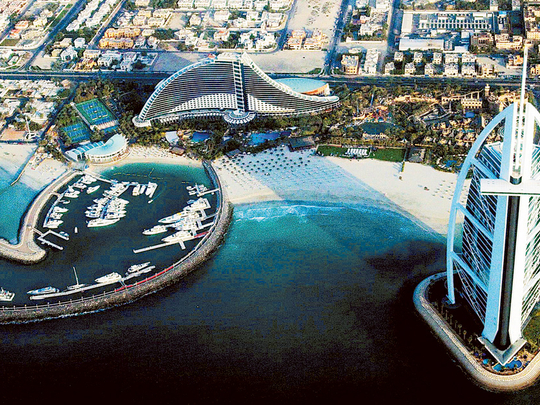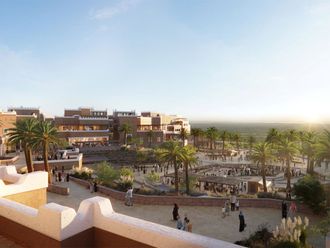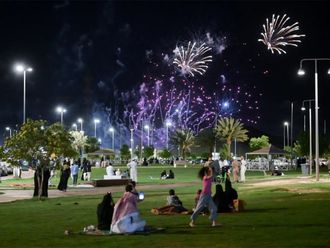
Dubai: Jumeirah Beach Road in Dubai has attracted the interest of a number of luxury hotel operators as space in other prime locations fills up.
Such hotel operators are looking at beachfront and city locations to open new properties, including Downtown Dubai and Business Bay, apart from Jumeirah Beach and Dubai Creek.
The crescent of the Palm Jumeirah is one of Dubai’s key locations for luxury hotels, and space there is tight, according to market experts.
The 800-room Royal Atlantis Resort is expected to open on the crescent of the Palm Jumeirah in 2018. The centre of the crescent is home to Atlantis The Palm, while the east of the crescent features Sofitel Dubai The Palm Resort and Spa, and Anantara Dubai The Palm Resort and Spa, among others.
“Along with Palm Jumeirah, the Jumeirah Beach area has positioned itself as Dubai’s prime leisure destination. The opening of luxury hotels on this stretch is not only a function of a lack of space on the Palm, but also due to the fact that Jumeirah Beach is a prime location in its own right,” said Yousuf Wahbah, Head of Transaction Real Estate transactions for the Middle East and North Africa at global consultancy, EY.
Jumeirah Beach, meanwhile, has attracted ultra luxury hotel companies such as Mandarin Oriental and Four Seasons Hotels and Resorts, that expect to open properties there in November 2014 and the second or third quarter of 2017 respectively.
Bulgari Hotels and Resorts plans to have a property on Jumeirah Bay Island, which is located off the coast of Jumeirah Beach, in 2018.
Analysts say that Jumeirah Beach will continue to attract luxury hotel operators. However, there are a limited number of waterfront land plots in the area.
Palazzo Versace, on the other hand, has gone away from the usual locations for luxury or designer hotels. The hotel is under construction in Culture Village on the foreshore of Dubai Creek.
“Nevertheless, the completion of the upcoming waterfront developments, such as The World Islands [and] The Palm Jebel Ali will offer prime waterfront locations suitable for luxury resorts, and this is likely to reduce the pressure on Jumeirah-Al Sofouh-JBR beach area in the future,” said Peter Goddard, managing director of TRI Consulting in Dubai.
Strong performance
The few number of waterfront land plots in Jumeirah Beach means that luxury hotel developers will need to look elsewhere.
“That said, for those developers who are able to secure plots along the Jumeirah Beach waterfront, with such high development costs [i.e. land], the economics are likely to push them towards building a luxury product, given the strong performance and premiums these hotels are able to achieve,” Wahbah said.
In the short term, luxury hotel groups will continue to focus on areas that include Jumeirah Beach, Palm Jumeirah, as well as Marina, Downtown and Business Bay, where a canal expansion will create a larger waterfront, he said.
Also, upcoming island developments, “such as The World Islands, and themed destinations in Dubailand are expected to attract strong interest from luxury operators in the future,” Goddard said.
Some hotel operators, such as Mövenpick Hotels and Resorts, have sought to open a hotel at Palm Jumeirah.
“We could do a great job on the Palm because we operate many resort hotels. But [the plot that] we got offered was actually a little bit too small,” Andreas Mattmuller, the company’s chief operating officer for the Middle East and Asia, previously told Gulf News.
However, other companies have not considered opening a property there.
“Palm Jumeirah was never our desired aim as location for Palazzo Versace Dubai, and one has to also keep in mind that the re-commencement of the Palm Deira development will undoubtedly contribute to shift the focus back to Dubai’s traditional centre; while Dubai is an ever changing landscape, the focal point of the Dubai Creek will always remain a constant,” said Raza Jafar, chief executive of UAE developer Enshaa that took full control of the Palazzo Versace project in 2011.
Simon Casson, regional vice president and general manager of the Four Seasons Resort Dubai, said the company chose Jumeirah Beach over the Palm because of its unique positioning.
“While the Palm is a unique and spectacular development, it doesn’t offer the exclusivity and unique positioning of North Jumeirah Beach,” he said.












